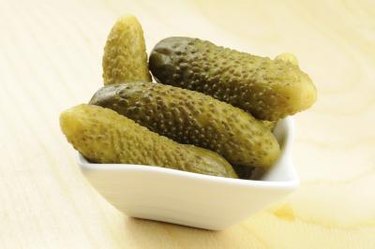
Kosher dill pickles are made from small cucumbers known as gherkins. Made in the traditional Jewish manner using dill, garlic and salt brine to give the characteristic mouth-puckering, sour, pungent flavor, Kosher dills have few calories and few nutrients, unless you eat them by the barrel full. Kosher dills do add spice to sandwiches and meat dishes such as the German dish Rouladen, which wraps beef around a dill pickle.
Nutrition
Video of the Day
A single small Kosher dill pickle contains only 5 calories, most of which come from carbohydrates. It would take 20 before you even reached 100 calories, which is just 5 percent of your daily calorie intake. The protein content in a dill pickle is just 0.22 g while the fat content is even lower, 0.05 g. The carbohydrate count is 0.96 g. The main sugar in the pickle is glucose, with the rest coming from fructose. Kosher dills are low in fat, with just 0.13 g per pickle.
Video of the Day
Vitamins and Minerals
While one small Kosher dill does contain a number of vitamins and minerals the amounts are minute. The pickle does supply 16 mg of calcium, which help build bone density, 34 mg of potassium, 4 mg of phosphorus, 3 mg of magnesium and trace amounts of iron, zinc copper and manganese. Dill pickles also supply 14 mcg of vitamin K, used to produce blood clotting factors and trace amounts of B-complex vitamins as well as 3 mcg of vitamin A. One mineral found in abundance in Kosher dills is sodium, used in processing. A single pickle contains 324 mg of sodium, or around 13 percent of your recommended daily allowance of 2,300 mg. Too many dill pickles in one day could use up your entire daily allowance of sodium.
Antioxidants
Dill pickles, like other vegetables, also contain small amounts of carotenoids, brightly colored pigments such as beta-carotene and lutein that can be converted to vitamin A and may act as antioxidants. Antioxidants attack molecules called free radical which cause cellular damage that can lead to heart disease, cancer or other diseases. Lutein may help protect your eyes from chronic diseases by filtering blue light from the retina. While dill pickles don't contain large amounts of these nutrients, they can comprise a small part of a healthy diet.
Fiber
Like other vegetables, pickles are a good source of dietary fiber. While the amount per pickle is small, just 0.4 g per pickle, every bit counts. The average American consumes just 15 g of fiber per day and should get at least 20 g, according to the Harvard School of Public Health. Fiber promotes regular bowel movements and also helps lower cholesterol and blood sugar levels, reducing the risks of both heart disease and diabetes.
- U.S. Department of Agriculture; Pickles, Cucumber, Dill or Kosher Dill
- Linus Pauling Institute: Sodium (Chloride)
- Linus Pauling Institute; Carotenoids; Jane Higdon, Ph.D.; December 2005
- Cooks.com: Rouladen
- Harvard School of Public Health: Fiber: Start Roughing It!
- Linus Pauling Institute; Vitamin K; Jane Higdon; May 2004